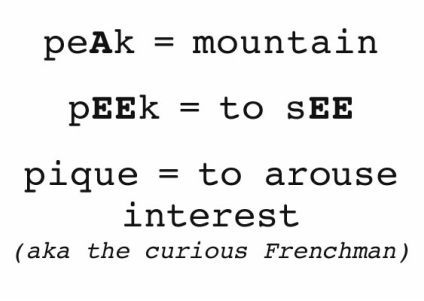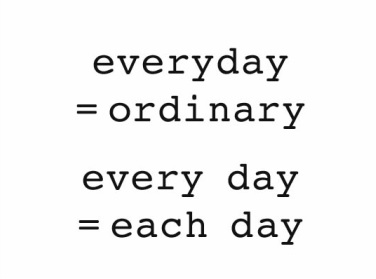I've seen this usage error many times, but after spotting it recently on the website for a Nashville TV station, I decided it was time to tackle this subject on the grammar blog.
Here is the egregious sentence:
"Possessions should never be covered with coats or towels as they only serve to peak the curiosity of thieves."
Peak, peek and pique are three words that sound the same but have vastly different meanings (homophones). In the case of these "P" words, if you aren't careful, you'll choose the wrong one. Let's run down the definitions for each to help you keep them straight.
A peak is something with a point, like a mountain peak or the peaks that form on a meringue.
Peek is sneaking a look at something.
Pique is to arouse interest, as in piquing someone's curiosity.
A memory aid for this one is a little tough, as the connections are counterintuitive. It would be easy to point out a connection between sneak and peak, but that's the wrong meaning. For peak, I suggest thinking of a capital A in peak to represent a mountain peak. For peek, I recommend thinking of the double e's in peek and see. I think pique is the toughest one for most writers because of its French derivation. It looks like it would be pronounced "pee-kay, "pee-Q" or even "pick." Because it's a little different, I think that's why folks often err toward using the more common-looking choices of peak and peek. When it comes to pique, try to think of a curious Frenchman looking inquisitive. (Inquisitive even has the "qu" letter combination.)
That's it. Just remember a mountain peAk, sEE and pEEk and a curious Frenchman.
Do you have a memory aid for distinguishing between peak, peek and pique? Did you know the different meanings for these words? (No shame or embarrassment here if you didn't!) Please share your thoughts in the Comments below.
Here is the egregious sentence:
"Possessions should never be covered with coats or towels as they only serve to peak the curiosity of thieves."
Peak, peek and pique are three words that sound the same but have vastly different meanings (homophones). In the case of these "P" words, if you aren't careful, you'll choose the wrong one. Let's run down the definitions for each to help you keep them straight.
A peak is something with a point, like a mountain peak or the peaks that form on a meringue.
Peek is sneaking a look at something.
Pique is to arouse interest, as in piquing someone's curiosity.
A memory aid for this one is a little tough, as the connections are counterintuitive. It would be easy to point out a connection between sneak and peak, but that's the wrong meaning. For peak, I suggest thinking of a capital A in peak to represent a mountain peak. For peek, I recommend thinking of the double e's in peek and see. I think pique is the toughest one for most writers because of its French derivation. It looks like it would be pronounced "pee-kay, "pee-Q" or even "pick." Because it's a little different, I think that's why folks often err toward using the more common-looking choices of peak and peek. When it comes to pique, try to think of a curious Frenchman looking inquisitive. (Inquisitive even has the "qu" letter combination.)
That's it. Just remember a mountain peAk, sEE and pEEk and a curious Frenchman.
Do you have a memory aid for distinguishing between peak, peek and pique? Did you know the different meanings for these words? (No shame or embarrassment here if you didn't!) Please share your thoughts in the Comments below.



